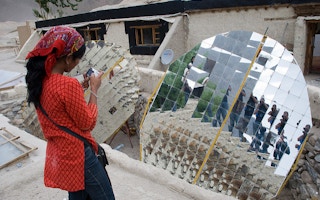A competition to find start-ups that could improve lives in Africa has highlighted the growing trend to tackle poverty through entrepreneurship.
Tiny companies working on clever ideas ranging from a battery retrofit for tuk-tuks to an online agency linking pupils to nearby experts had the chance to air their ideas in front of an audience of potential investors in London last week.
The event, known as Pitch@Palace Africa, came in the same week as the launch of an alliance for West African entrepreneurs in Accra, Ghana, where ministers said entrepreneurship was a possible route out of the youth unemployment that plagues parts of the continent.
But an expert cautions that entrepreneurship cannot boost development without investment in infrastructure and skills.
Amongst the pitches was a solar cooker that hopes to beat problems with earlier models using electronics which allow it to track the sun. Its producer, Water&Solar100, is trying to fund a rollout to poorer communities by also promoting it to the well-off as an eco-barbeque that can be used on the beach.
Another pitch, which is about to undergo trials in Kenya’s Kibera slum, gives women a number to text to be alerted to water availability at their location.
Its inventor, Kelvin Gacheru, founder of Mobitech Water Solutions, hopes it will save women hours searching for water while also driving down its price because women will be able to make shrewder purchasing decisions.
David Ockwell of Sussex University, says that Africa is typical of a new focus within development which hopes to harness free market entrepreneurship in the field of technology.
He cautioned that, while welcome, the “fixation” on free markets can’t succeed unless donors have also invested in building up infrastructure and skills.
On solar energy, for instance, Ockwell and colleagues will soon publish a study showing that Kenya’s market for off-grid solar panels, often touted as a free market success, could not have happened if donors had not built up capacity in key parts of the market.
For example, detailed research into how the poor use energy and where policy prevents progress has paved the way to the private sector’s success, he said.
Meanwhile, hopes that entrepreneurship could help African countries out of their youth unemployment crises were highlighted at the launch of the Commonwealth Alliance of Young Entrepreneurs –West Africa in Accra.
Isaac Kwame Asiamah, Minister for Youth and Sports said that the alliance would “accelerate entrepreneurs’ social, political and economic integration through peer to peer learning and networking among the youth of West African states.”
The number of young people across the continent is set to double to 850 million by 2050, according to the International Labour Organisation.
This article was originally published on SciDev.Net. Read the original article.










